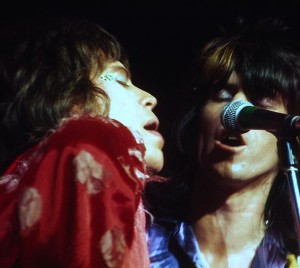
I’ll never forget the first time I remember hearing a Rolling Stones song.
Eight years old, perched in the middle spot of a bench seat at the front of a school minibus, packed to the brim with our worldly possessions temporary transformed into a makeshift moving van.
Due to the obvious age requirements that my 10 year-old brother and I did not meet, my father was behind the wheel, meaning that in addition to being tasked with piloting a vehicle with the turning circle of a small yacht, he was also in charge of the music.
Looking back, it was probably a good choice; if we had our way MMMBop probably would’ve been playing – we were too young for Biggie – or some other one-hit wonder spawned from some big label recording studio in 1997.
But getting back on topic, somewhere along Melbourne’s Calder Freeway, Sympathy For the Devil came on the airwaves. Despite naively asking my father whom the song was about, and barely recalling a word from the song, my brother and I remembered one thing.
The distinctive ‘who who’ melody, that runs as the undercurrent for a litany of man made tragedies that litter the history books of humanity. Long after the guitar riff had faded, we continued to belt out the only two words – well, one really – that we remembered.
And with that, a love affair was born.
Forty Licks was the first real album I ever bought; a two-disc record that was almost certain ruined by years of overplaying. Despite the fact that by the time I discovered such classics as Gimme Shelter, Ruby Tuesday and Angie, the members of the band were old enough to be my grandparents, the music still resonated.
Posters from concerts years before my birth adorned bedroom walls, and a handful of t-shirts filled my wardrobe.
So, with reports surfacing in the Stones homeland over the weekend that a series of shows – fittingly, culminating in a Glastonbury headlining farewell – are set to mark the end of arguably the most defining band ever to grace charts the world over, it’s worth remembering that the Rolling Stones were so much more than just a band.
Their musical influence is well documented, and while integral to the band’s success, their lasting legacy is the influence the band had on society.
A side effect of frequent courthouse and jail-cells visits, and tales of rampant drug and alcohol abuse, it’s easy to overlook the positive impacts the group had on society during the times they rose to prominence.
As citizens in their homeland and the US fought for civil rights, the biggest band in the world were recording with prominent African American artists like Muddy Waters and Bo Diddley, infusing American blues music with the pop culture consciousness.
In no way can Mick, Keith and Co. be credited for the success of the civil rights movement, but the manner in which they introduced a younger generation that was an integral facet in the movement to – at the time – different cultures, cannot be ignored.
Although, the music was never overtly political, the message always there, bubbling just below the surface.
Even in arguably their most outright protest song, Sweet Black Angel – written about the plight of civil rights activist Angela Davis, who was facing murder charges, the listener could still overlook the politically charged lyrics and get lost in the rhythmic flow of the bluesy ballad.
In reality, that’s what is at the core of their omnipresence since debuting in a danky London bar.
While many would view The Beatles as something of an embodiment for the societal changes of their time, ultimately their conscience would get in the way of their music. Contemporaries like The Who and Bob Dylan, despite their profound brilliance, would ultimately burn out and fade away.
Meanwhile, The Rolling Stones endured, tricking us into believing that, hey, it’s only rock and roll.
Liam Quinn is a second-year Bachelor of Journalism student at La Trobe University, and is currently on exchange at Michigan State University. You can follow him on Twitter: @liamquinn23.






